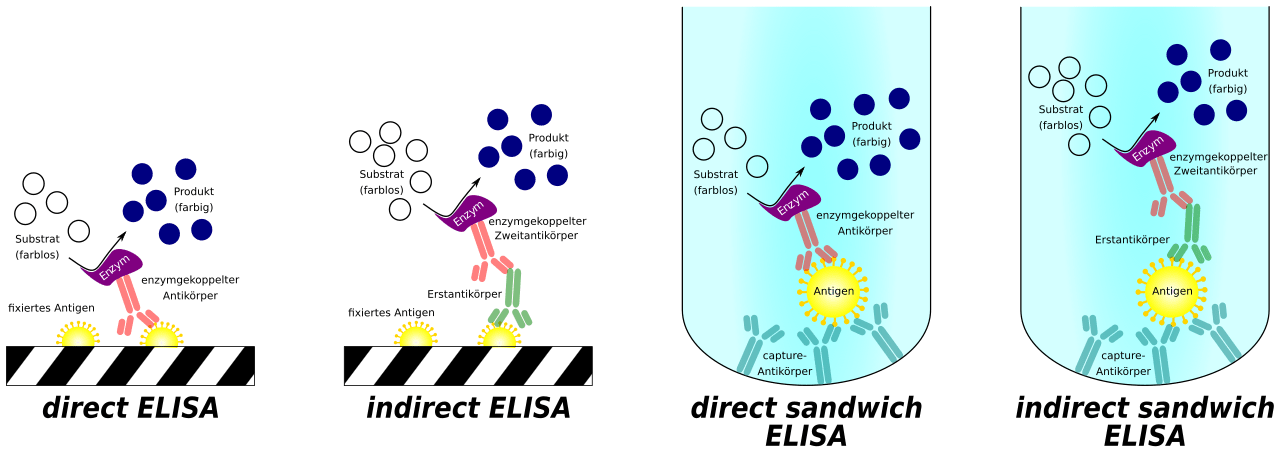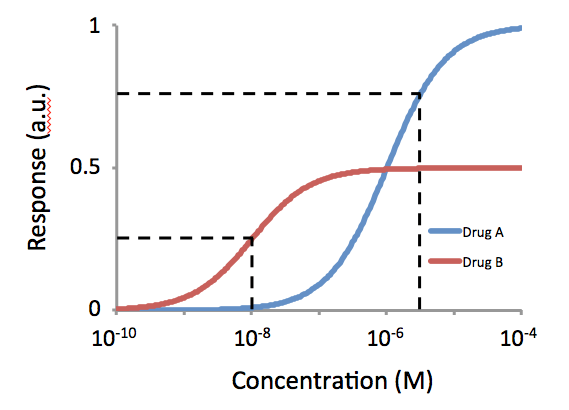Difference Between Assay and Potency
Table of Contents
The key difference between assay and potency is that an assay is the testing of a material to determine its ingredients and quality whereas potency is the amount of a drug required to get an effect at its maximum intensity.
Usage of these two terms, assay and potency, are common in biochemistry and pharmacology.
CONTENTS
1. Overview and Key Difference
2. What is Assay
3. What is Potency
4. Side by Side Comparison – Assay vs Potency in Tabular Form
5. Summary
What is Assay?
Assay is the testing of a material to determine its ingredients and its quality. Therefore, it is a qualitative and quantitative analysis. An assay can be used to determine the presence of a particular component, to determine the amount of a component present, or to determine the functional activity of a particular component. The component that is being measured is called as the analyte or the target.

Figure 01: Different ELISA Techniques (ELISA is the Enzyme-Linked Immunosorbent Assay)
Method
A typical assay has the following steps;
What is Potency?
Potency is the amount of a drug required to get an effect at its maximum intensity. This means a highly potent drug can give the desired response in a low dose. In contrast, a drug having a low potency gives the desired response at a high dose.
The potency of a drug depends on two factors;
The response given for a drug is the effect of the drug on our body. This effect depends on both the binding of the drug with the receptor (affinity) and the production of the response after the attachment of the drug with a receptor (efficacy).

Figure 02: The Potency of Two Different Drugs
At lower doses of the drug, the effect is also low. When the dose increases, the effect also increases until it reaches the maximum possible effect of the drug. But when the dose is further increased, the effect does not raise. And also even if the dose of the drug is increased, there can be some side effect as well. Therefore, a higher potency sometimes results in side effects. If the effect of the drug is denoted by “E”, then the maximum possible effect is termed as “Emax”. When the effect is equal to half of the Emax, the concentration of the drug is called half maximal effect concentration. This value is the potency of the drug.
What is the Difference Between Assay and Potency?
Assay vs Potency | |
| Assay is the testing of a material to determine its ingredients and quality. | Potency is the amount of a drug that is required to get an effect at its maximum intensity. |
| Application | |
| Used for experiments which are used to identify and quantify components in a sample. | Used to describe the effectiveness of a drug. |
| Method | |
| Step involves sample preparation, discrimination, amplification, and analysis. | Determine the potency of a drug by finding the half maximal effect concentration of the drug. |
Summary – Assay vs Potency
An assay is an experiment used commonly in chemistry and biochemistry in order to analyze a sample qualitatively and quantitatively. The term potency is, especially, in use in pharmacology to describe the effectiveness of a drug. The difference between assay and potency is that an assay is the testing of material to determine its ingredients and quality whereas potency is the amount of a drug required to get an effect at its maximum intensity.
Reference:
1. “Assay.” Wikipedia, Wikimedia Foundation, 10 Apr. 2018. Available here
2. “Potency (Pharmacology).” Wikipedia, Wikimedia Foundation, 10 Apr. 2018. Available here
Image Courtesy:
1.’ELISA’By Jiver – Own work, (CC BY-SA 4.0) via Commons Wikimedia
2.’Potency Figure16’By Klbrain – Own work, (CC BY-SA 4.0) via Commons Wikimedia
ncG1vNJzZmivp6x7pbXFn5yrnZ6YsqOx07CcnqZemLyue8OinZ%2Bdopq7pLGMm5ytr5Wau26t0qyYsmWRo7FuvM6tnKebqWQ%3D